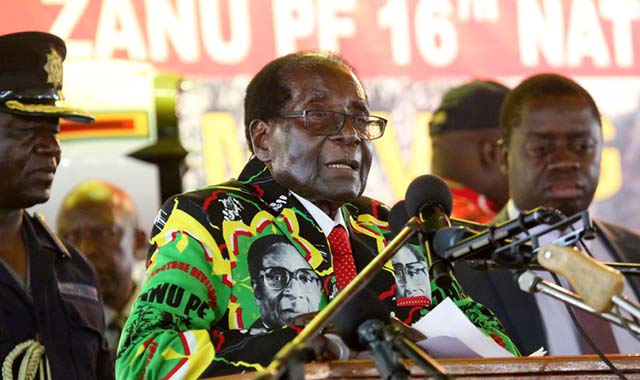Celebrating festive season with Father Christmas
Sekai Nzenza on Wednesday
“Oh, jingle bells, jingle bellsJingle all the way
Oh, what fun it is to ride
In a one horse open sleigh
Jingle bells, jingle bells
Jingle all the way
Oh, what fun it is to ride
In a one horse open sleigh . . .”
This was the song that greeted us in the big wholesale supermarket on Saturday as my cousin Reuben and I walked through the door. “If they keep on using old white guys as Father Christmas, they will soon run out of them,” said Reuben, as we walked past an elderly white man sitting in a chair dressed up as Santa Claus or Father Christmas.
There was a long line of people with children eagerly waiting for a turn to place their child on the lap of Father Christmas then pose for a photo. Every year, as Christmas Day approaches, we continue to celebrate this European Christian tradition.
Even though we live down here in the Southern part of the world, we wait for Father Christmas to come down from the “North Pole”, with his reindeers and a sledge. He must wear his red warm jacket, beard, hat and boots, like he has been walking in the snow.
“Mudhara iyeye uyu, achafenda neheat. Mirai muone,” Rueben said again, meaning the Father Christmas will faint from the heat because his outfit is really meant for the snow.
I casually tell him that Christmas would not be Christmas unless we see a white Father Christmas, pine trees, presents and plenty of lights. In America and in many other parts of the world, there are streets with houses competing for the best Christmas decorations.
I recall coming to the city many years ago with my older sister Constance and daughter Kudzai. It was the first Christmas after Independence and we could freely go into shops that used to be frequented mostly by white people only.
Constance said there were Christmas lights in the Harare Gardens and in First Street. People came from Highfield, Chitungwiza, Mufakose, Mabvuku and from all over the African townships to see the decorations.
During the day, they could bring children to pose for a photo with the white Father Christmas in the shops.
We arrived in one big shop along First Street. Before Independence, I had walked hurriedly past this shop before but did not go inside it. I thought it was for white people with money only although there was no sign to say that.
That day before Christmas, I was still scared of going into the shop, because everything looked so clean and very nice. We were so far away from the village store that I was so familiar with. The lift was operated by an African man wearing a uniform and gloves.
Constance, Kudzai and I found Father Christmas. He was sitting in a big chair on the first floor or maybe it was the third or second floor. I cannot recall.
Father Christmas greeted us warmly and said, “Ho ho. Merry Christmas! Merry Christmas! Ho ho ho.” He opened out his arms to take Kudzai so she could sit on his gentle lap and pose for a photograph. But the child took one look at him and screamed.
She turned her head away and tried to hide it under Constance’s arm pit. People waiting with their children to have a turn to sit on the lap of Father Christmas laughed at us, saying and mwana haazive murungu. The child has never seen a white man. That was true. But we ignored that comment because it was all too embarrassing.
How could we admit that our child had never seen a white man? In those days, we lived in Glen Norah B flats and had never taken Kudzai to the city. “Sekuru ava havarume, usatye hako,” Constance told Kudzai not to be afraid. The white sekuru was not going to eat her. Kudzai still cried. But we still forced her to sit on Father Christmas’s lap. We wanted a photo so we could show everyone back in the village that we had met Father Christmas and Kudzai actually sat on his lap.
Back in the village homestead, we never saw Father Christmas. On Christmas Eve and Christmas Day, we paid respect to Jesus Christ at church.
But my grandmother, Mbuya VaMandirowesa, paid little attention to the birth of Jesus Christ. She did not even believe that Jesus was born on Christmas Day and that he was the Son of the Virgin Mary and also the Son of God.
Every Christmas time, Mbuya VaMandirowesa ordered the killing of a beast for us to eat on Christmas Day. But my father always said no, the beast must be killed after we had celebrated the birth of Jesus Christ. This meant we would go to St Columbus School for the all night preaching and prayer on Christmas Eve. Then on Christmas Day we dressed up in new clothes, and waited for Baba Mutemarari, the Anglican priest to pass by.
My mother told us to watch out for Baba Mutemarari. Once we spotted him coming, my mother quickly instructed us to cover the two big pots of the highly potent mhanga beer under sacks and blankets then close the kitchen hut.
My brother Charles dragged our famous drum called “Zino Irema” and hid it in the granary. My father switched off his Mahlathini and the Mahotela Queens music and hid the gramophone in the bedroom.
Baba Mutemarari always stopped in our village compound on his way from St Peter’s to conduct communion at St Columbus School on Christmas Day.
Upon arrival, Baba Mutemarari was thirsty for tea and hungry for fresh bread with Stork margarine and Sun jam. He was invited into to drink tea with us.
We all sat down near him and spoke in low voices. Mbuya VaMandirowesa came to join us. She sat there taking her snuff, right in front of Baba Mutemarari.
As they drank tea, Baba Mutemarari and my father talked about the Anglican Church and how it supported education among Africans. Inside the kitchen hut, the mhanga beer was frothing under sacks and blankets while “Zino Irema” the drum waited patiently for the evening.
After mass, we rushed back home to eat more bread smothered with margarine and plenty of jam.
Visitors from the village around came and joined us in drinking sweet tea. My father, my uncles and their friends got busy drinking both village beer, Castle and Lion lagers from Salisbury. They also enjoyed the rice and chicken while we waited for the slaughtering of the beast. By evening time, the village was full of laugher, conversation, song and drumming.
On Boxing Day, the elders gathered in Mbuya VaMandirowesa’s kitchen hut for the ceremony to thank the ancestors.
The beast was slaughtered and we ate plenty of meat. Later on during the day, young people went to Muzorori & Sons Stores to dance to new songs.
Muzorori & Sons Stores was the place for music and Christmas fun. Here, you showed off your best dress and your best hair style.
Young men from the city wore bell bottom trousers and platform shoes with Afro combs sticking out of their hair. They danced to Dolly Parton, Percy Sledge, Rod Stewart and also to Thomas Mapfumo and Oliver Mtukudzi.
This Christmas, back here in the village, we do not have a white man to play Father Christmas. Besides, we cannot afford the Christmas trees with bells, lights and all the bright decorations of the European Christmas.
On Christmas Day, the people will go up to the Catholic Church up the hill and beat our drum Zino Irema.
Then they will bring the same drum down the hill to the village compound.
They will slaughter a goat and some chickens, then offer beer in libation to the ancestors. Later on, they will sing and dance to the drum.
In Harare, we hope, the elderly European Father Christmas will still be in the supermarket next year.
According to a BBC news report on December 2, 2016, the Mall of America, the biggest indoor shopping complex in the USA, hired Larry Jefferson as the first black Santa Claus this year.
Although black Santas have been around for some years, they have not been many in America. I have never seen one in Zimbabwe.
Perhaps it is time for us to find a black Father Christmas for the big shops because the European Santas are getting old.
They deserve to retire from noisy shops and screaming children who have never sat on the lap of an old white man.
Dr Sekai Nzenza is a writer and cultural critic.







Comments